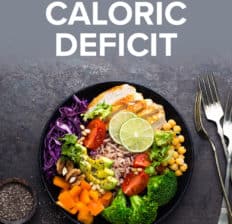This Dr. Axe content is medically reviewed or fact checked to ensure factually accurate information.
With strict editorial sourcing guidelines, we only link to academic research institutions, reputable media sites and, when research is available, medically peer-reviewed studies. Note that the numbers in parentheses (1, 2, etc.) are clickable links to these studies.
The information in our articles is NOT intended to replace a one-on-one relationship with a qualified health care professional and is not intended as medical advice.
This article is based on scientific evidence, written by experts and fact checked by our trained editorial staff. Note that the numbers in parentheses (1, 2, etc.) are clickable links to medically peer-reviewed studies.
Our team includes licensed nutritionists and dietitians, certified health education specialists, as well as certified strength and conditioning specialists, personal trainers and corrective exercise specialists. Our team aims to be not only thorough with its research, but also objective and unbiased.
The information in our articles is NOT intended to replace a one-on-one relationship with a qualified health care professional and is not intended as medical advice.
What Is a Calorie Deficit? Does It Work for Weight Loss? Separating Fact From Fiction
May 20, 2023

When people are trying to lose weight fast, it’s common to attempt a calorie deficit. Consuming fewer calories than your body uses can help you meet your weight goals, but it needs to be done correctly to be effective.
How many calories you need in a day depends on a lot of factors, including your age, weight and lifestyle. Once you’ve established that number, you can calculate how many calories you should consume daily to create a deficit.
Then you must approach this mindset in a healthy and balanced way — reducing portion sizes, paying attention to your body’s hunger cues, choosing nutrient-dense and satisfying foods, and focusing on your mental health, too.
When weight loss isn’t approached in a healthy and sustainable manner, even a calorie deficit won’t be effective for long-term results.
What Is a Calorie Deficit?
A calorie deficit refers to when the number of calories consumed is lower than the number of calories expended by an individual. In other words, you consume fewer calories than your body needs to maintain its current weight.
This creates an energy imbalance, prompting your body to tap in to its stored fat as a source of energy instead.
Creating a calorie deficit is often associated with weight loss because when the body is in a calorie deficit, it must rely on stored fat for energy, leading to a reduction in overall body weight.
To establish a calorie deficit, you have to consume fewer calories through your diet or increase calorie expenditure with more physical activity. The size of the calorie deficit required to achieve weight loss depends on various factors, such as your basal metabolic rate, activity level and weight loss goals.
Does It Lead to Weight Loss?
A calorie deficit can lead to weight loss, but there is research to suggest that it doesn’t always work in the long term.
Weight loss occurs when the body’s energy expenditure exceeds its energy intake over a sustained period of time. When you consistently consume fewer calories than your body needs to maintain its current weight, your body will begin to utilize stored fat as a source of energy. This leads to a reduction in overall weight because the body needs to tap in to its fat reserves to make up for the energy deficit.
While studies suggest that the “calories-in, calories-out” model is effective for short-term weight loss, there are physiological factors to consider. The body experiences metabolic adaptations that decrease energy expenditure as a result of eating a low-calorie diet. This can lead to weight loss plateaus, which can cause frustration and a notion of “failure”
Research published in Perspectives on Psychological Science found that, by itself, decreasing calorie intake has a limited short-term influence on body weight. The report concludes that people with weight loss goals are better served by concentrating on the nature of foods they consume than simply reducing calories.
Extreme calorie deficits or rapid weight loss can have negative effects on overall health and may not be sustainable long term. It’s recommended to aim for a modest and gradual weight loss of one to two pounds per week, which can be achieved through a moderate calorie deficit and a balanced approach to nutrition and physical activity.
How to Calculate Calorie Needs
Calculating your calorie needs involves estimating the number of calories your body requires to maintain its current weight based on factors such as age, gender, weight, height, activity level and goals.
While various formulas and methods exist, one commonly used approach is the Harris-Benedict equation, which is used by many nutrition and health professionals to calculate a person’s caloric requirements.
Here’s a general guide on how to calculate your calorie needs using this equation:
1. Determine Your Basal Metabolic Rate (BMR)
Your basal metabolic rate represents the number of calories your body needs at rest. The Harris-Benedict equation provides separate formulas to determine this number for men and women:
- Male: 66 + (6.2 × weight in pounds) + (12.7 × height in inches) – (6.76 × age in years)
- Female: 65.5 + (4.35 × weight in pounds ) + (4.7 × height in inches) – (4.7 × age in years)
2. Adjust for Activity Level
Once you calculate your BMR, you need to multiply it by an activity factor to account for your physical activity level.
Here are some common activity factors:
- Sedentary (little to no exercise): BMR × 1.2
- Lightly active (light exercise/sports 1–3 days a week): BMR × 1.375
- Moderately active (moderate exercise/sports 3–5 days a week): BMR × 1.55
- Very active (hard exercise/sports 6–7 days a week): BMR × 1.725
- Extra active (very hard exercise/sports and a physical job): BMR × 1.9
3. Adjust For Your Weight Goals
To achieve weight loss, aim for a calorie deficit by consuming fewer calories than your calculated total. The general recommendation is to aim for a deficit of 500–1,000 calories per day for a gradual and sustainable weight loss of one to two pounds per week.
Conversely, to gain weight, you would aim for a calorie surplus by consuming more calories than your calculated total.
It’s important to note that these calculations provide estimates, and individual variations do exist. Factors such as muscle mass, metabolism and other health considerations can influence calorie needs.
How to Create a Calorie Deficit for Weight Loss
Creating a calorie deficit requires the consumption of fewer calories than your body needs, forcing it to tap in to stored energy (body fat) to make up the deficit. Here are some strategies to create a calorie deficit successfully:
- Determine Your Caloric Needs: Calculate your daily calorie needs using a reliable online calorie calculator or the Harris-Benedict equation above. This estimate will give you a starting point to understand how many calories you require to maintain your current weight.
- Set a Realistic Goal: Decide on a reasonable and achievable weight loss goal. A safe and sustainable rate of weight loss is typically around one to two pounds (0.5–1 kg) per week.
- Track Your Caloric Intake: Keep a food journal or use a mobile app to track your daily calorie intake. Be meticulous about recording all the foods and beverages you consume, including portion sizes.
- Reduce Portion Sizes: Gradually reduce your portion sizes to consume fewer calories. Use smaller plates and bowls, and be mindful of serving sizes recommended on food labels. This approach can help stay in control of your calorie intake without feeling deprived.
- Choose Nutrient-Dense Foods: Focus on consuming low-calorie foods that are rich in nutrients. Opt for lean proteins, whole grains, fruits, vegetables and healthy fats. These foods are generally more filling and provide essential nutrients while keeping your calorie intake in check.
- Limit High-Calorie Foods and Beverages: Minimize or avoid foods and beverages that are high in added sugars, unhealthy fats and empty calories. These include sugary drinks and sodas, desserts, fried foods, processed and packaged snacks, sugary cereals, and baked goods. Replace them with healthy snacks, water and fresh foods whenever possible.
- Increase Physical Activity: Engaging in regular exercise can help create a calorie deficit by burning extra calories. Incorporate a combination of cardiovascular exercises (such as walking, running, swimming or cycling) and strength-training exercises (like weightlifting or bodyweight exercises). This will not only burn calories, but will also help preserve lean muscle mass, which is important for maintaining a healthy metabolism.
- Be Mindful of Liquid Calories: Pay attention to the calories you consume in beverages. Sugary drinks, alcohol and certain juices can contribute a significant amount of calories without providing much satiety. Instead, choose water, seltzer, unsweetened tea or black coffee as your primary beverages to minimize calorie intake.
- Practice Moderation: It’s not necessary to completely eliminate your favorite foods in order to create a calorie deficit. Instead, practice moderation and portion control. Allow yourself occasional treats while staying within your overall calorie goals, and pay close attention to your hunger cues. Stop eating when you feel full, drink water in between meals and snacks, and slow down while eating.
Remember, creating a calorie deficit should be done in a balanced and sustainable manner. It’s important to prioritize overall health and well-being while aiming for weight loss in order to have a long-lasting impact.
Risks and Side Effects
While a calorie deficit can be an effective strategy for weight loss, it’s important to be aware of potential risks and side effects. Here are some considerations:
- Nutrient Deficiencies: Severely restricting calories may lead to inadequate intake of essential nutrients, including vitamins, minerals and macronutrients. To mitigate the risk of nutrient deficiencies, focus on consuming nutrient-dense foods, and consider working with a registered dietitian to ensure you meet your nutritional needs. Opt for a range of colorful whole foods to ensure that you get the nutrients your body needs to thrive.
- Decreased Energy Levels: Consuming fewer calories than your body needs may lead to reduced energy levels, especially if the calorie deficit is significant or prolonged. You might experience fatigue, decreased motivation, brain fog or difficulty performing high-intensity exercise. Make sure you get adequate rest and balanced nutrition. Listening to your body’s signals is important, too.
- Slowed Metabolism: Prolonged calorie restriction can cause your body to adapt by slowing down your metabolic rate. This is known as adaptive thermogenesis, where your body becomes more efficient at conserving energy, and it can make weight loss more challenging over time. To mitigate this, avoid excessive calorie restrictions, incorporate regular strength training to preserve muscle mass and periodically reassess your calorie needs as you lose weight.
- Muscle Loss: When in a calorie deficit, your body may turn to muscle tissue for energy if protein intake is inadequate or exercise is not properly balanced. This can result in muscle loss, which is undesirable as muscles help support a healthy metabolism and body composition. To avoid muscle loss, practice regular strength-training exercises and consume adequate protein to support muscle maintenance.
- Hormonal Changes: Extreme or prolonged calorie deficits can disrupt hormonal balance in the body, which can impact reproductive hormones, thyroid hormones and other metabolic processes. It’s important to approach calorie deficits with moderation and monitor any potential hormonal changes or symptoms.
- Psychological Effects: Calorie deficits, particularly when taken to extremes, can have psychological effects. Some individuals may develop an unhealthy relationship with food, experience feelings of deprivation or develop disordered eating patterns. It’s critical to prioritize mental and emotional well-being throughout your weight loss journey and seek support if needed.
Conclusion
- A calorie deficit refers to when the number of calories consumed is lower than the number of calories expended by an individual. When you consume fewer calories than your body needs to maintain its current weight, you create a calorie deficit.
- Calorie deficit is commonly used for weight loss, and it can be effective when done in a balanced, mindful way. It’s important to eat nutrient-rich foods, reduce portion sizes and prioritize your mental health while aiming for weight loss goals.
- There are some potential side effects when using a calorie deficit to lose weight, which include nutrient deficiencies, fatigue, psychological effects and hormone changes. It’s critical that you approach a calorie deficit diet in a healthy and sustainable way.













